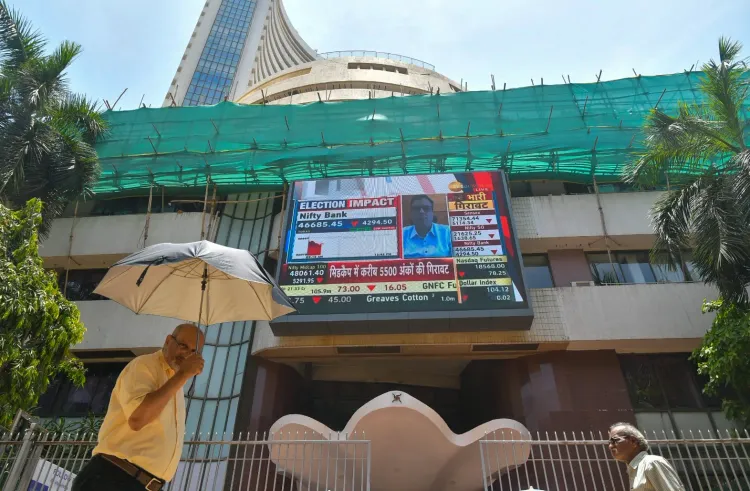Why Did Nifty and Sensex Dip in Early Trade?

Synopsis
Key Takeaways
- BSE Sensex fell by 112 points.
- Nifty 50 dropped by 41 points.
- Broader markets showed underperformance.
- Investors should focus on domestic consumption sectors.
- Market remains in a bullish sentiment.
Mumbai, Aug 20 (NationPress) The Indian benchmark indices experienced a slight decline during the Wednesday morning session, influenced by mixed global cues.
The BSE Sensex decreased by 112 points, or 0.14 percent, settling at 81,531. Likewise, the Nifty 50 fell by 41 points, or 0.16 percent, reaching 24,939.
The broader markets lagged behind, with the Nifty Midcap 100 and Nifty Smallcap indices dropping 0.17 percent and 0.19 percent, respectively.
Nifty Bank reported a decline of 0.42 percent, while other indices recorded modest losses up to 0.50 percent.
Previously, the NSE's benchmark index Nifty surged by 364 points over the last three days, buoyed by positive announcements regarding GST reforms anticipated to be enacted before Diwali.
“A sustained rally seems unlikely as the news from the US administration regarding the August 27 deadline for a 25 percent secondary tariff on India is disheartening. The tariff policies of US President Donald Trump appear to lack logic and fairness, driven by personal whims,” commented Vinod Nair, Head of Research at Geojit Investments Limited.
In the short run, investors are likely to concentrate on domestic consumption sectors such as banking and financials, telecommunications, hotels, healthcare, automobiles, and cement, especially in the fairly valued segments, he added.
Technically, the Nifty has been consolidating in a sideways-to-bullish trend after a gap-up opening.
“The index continues to find substantial support at nearly every major EMA level, suggesting robust underlying strength,” noted Mandar Bhojane from Choice Equity Broking.
If the Nifty maintains its position above 25,050, it may advance towards 25,250 and 25,500 in upcoming sessions. Analysts believe the market remains in a bullish sentiment, and dips could offer buying opportunities.
Early trading in the Asia-Pacific region saw markets decline, following Wall Street's overnight drop as investors assessed Japan’s trade data. Japan's exports dipped 2.6 percent YoY in July, marking the steepest decline in four years, exceeding analysts' predictions of a 2.1 percent YoY drop.
In the US, the Dow Jones edged up 0.02 percent, while the NASDAQ fell 1.46 percent and the S&P 500 dropped 0.59 percent.
In Asia, China's Shanghai and Shenzen indices fell by 0.04 percent and 0.59 percent, respectively. Japan's Nikkei declined by 1.52 percent, while Hong Kong's Hang Seng index dropped 0.41 percent, and South Korea's KOSPI was down 1.86 percent.
On Tuesday, foreign institutional investors (FIIs) resumed net selling after a brief buying spree, offloading Indian equities worth Rs 634 crore. Meanwhile, domestic institutional investors (DIIs) continued to provide support with net purchases totaling Rs 2,261 crore.
–IANS
aar/na









